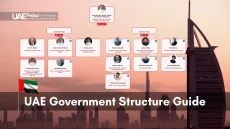UAE Federal Laws are key to the United Arab Emirates’ legal system. They start as ideas and grow into laws. This journey is interesting, mixing old values with new rules. Did you know that laws need the President and Supreme Council’s okay to be laws? This makes sure they are fair and right for everyone. Creation and Implementation, The UAE’s legal system balances tradition with progressive governance.
The Constitutional Framework of UAE Federal Laws
The UAE Constitution is the heart of the country’s politics. It explains the roles of federal bodies and the start of laws. This document is key in making the UAE’s laws.
Role and Structure of the UAE Constitution
The UAE Constitution is the top law. It makes sure everyone is treated equally. It protects rights like moving freely, speaking, and believing what you want.
It also says Islam is the official religion. This means laws are made with Sharia principles in mind.
Federal Government Authorities and Their Powers
The UAE has five main federal bodies. These are the Supreme Council, the President and deputies, the Council of Ministers, the Federal National Council, and the Federal Judiciary. Each has a special job in ruling and making laws.
| Federal Authority | Primary Role |
|---|---|
| Supreme Council | Highest constitutional authority |
| President and Deputies | Executive leadership |
| Council of Ministers | Federal executive body |
| Federal National Council | Parliamentary body |
| Federal Judiciary | Interpretation and application of laws |
Jurisdiction and Scope of Federal Legislation
The Federal Government has special power in important areas. These include foreign affairs, defense, public health, and education. The Constitution lets Emirates handle local issues not given to the Federal Government. This keeps a balance between federal and local rules.
UAE Federal Laws: Legislative Process and Implementation
The UAE has a clear way of making laws. It checks laws well before they are made. This makes sure laws are good for everyone.
Draft Law Development by the Cabinet
The Cabinet starts making new laws. They create the first drafts. This is the first step in making new rules.
Federal National Council’s Review Process
Then, the bill goes to the Federal National Council (FNC). The FNC checks the bill. They can change it or say no if it’s not right.
Presidential Approval and Supreme Council Ratification
After the FNC checks it, the President looks at it. The Supreme Council then says it’s okay. This makes sure laws are good and fair.
Publication and Enforcement Procedures
When it’s okayed, the President signs it. It becomes a law after a month in the Gazette. This gives everyone time to get ready.
Emergency Decree Laws and Their Implementation
In emergencies, the President can make laws quickly. These laws need approval from the Council soon. This helps when things need to happen fast.
The UAE’s way of making laws is careful. It makes sure laws are good before they start. This helps the country run well and follow laws.
| Legislative Milestone | Timeline |
|---|---|
| New federal laws issued in 2023 | 10 |
| Specialists involved in legislative plan | Over 1500 |
| Government teams in legislative process | 50 |
| Total federal legislations in 2023 | More than 73 |
Read more: Key Federal Entities and Their Functions in the UAE
The UAE has a smart legal system. It mixes national goals with what each emirate needs. This is based on the UAE Constitution.
Many groups work together to make laws. The Cabinet starts, then the Federal National Council reviews. The President finally says yes or no. UAE laws affect everyone. For example, a new law on sports aims to get more people active. It also helps businesses invest in sports.
Another law deals with climate change. It sets rules for tracking emissions and making plans to adapt to climate change. Breaking these rules can cost a lot of money. The Ministry of Justice is making things easier. It has made 95% of its services online. This includes filing documents and accessing laws online.
The UAE keeps improving its laws. It tackles today’s problems and looks forward to tomorrow’s success.

















